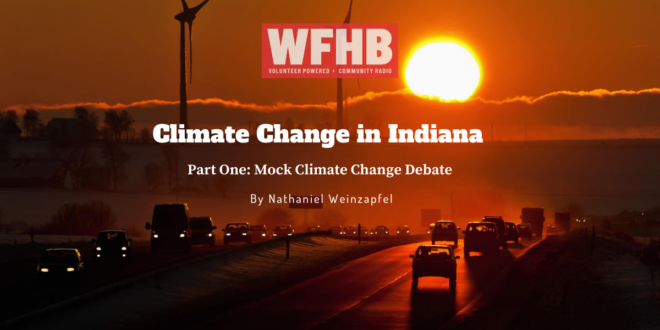Podcast: Play in new window | Download (Duration: 10:05 — 13.9MB)
Subscribe: RSS
By Nathaniel Weinzapfel
Introduction:
*This story originally aired on Earth Day, April 22nd.
First held in 1970 and recently reaching its 50th year anniversary, Earth Day is an annual holiday held to demonstrate support for environmental protection and celebrate life on our planet, with over a billion people participating in related events worldwide. In celebration of Earth Day today, WFHB presents a mock climate change debate with Professor Ben Kravitz, a climate scientist and assistant professor at Indiana University. The Professor and I went back and forth with myself portraying a climate denier asking him questions or making statements that are skeptical of climate change. The Professor, with his prior experience with climate change skeptics, was able to explain why common climate myths are incorrect. Ideally, you listeners out there can understand his arguments and hopefully be able to debate your relatives more effectively at the next family gathering! Now without further ado, here is the Q&A.
Q&A Section:
I’m going to ask the professor questions that a climate change denier would say or comments, they would say, so that we can see how a climate scientist would respond so that you listeners at home can be able to tell your relative why they’re wrong. So….
I’ll do my best.
For this first one it is. So it was such a cold winter, there was a big snowstorm at the beginning of February, surely global warming can’t be happening if it is still so cold.
Well, winter is always going to be cold. We’re not talking about winter, suddenly becoming summer. And also, one of the most important words in the phrase global warming is global. A snowstorm in one place doesn’t necessarily mean anything. What we’re looking at is large scale changes over a long time period, which is what’s happening under global warming, and how those changes might affect individual locations.
And so when it comes to global climate, some people say the climate is always changing. The Earth goes through a series of warming and cooling periods. There was a cooling period during the medieval times. Would it be possible that right now we’re just going through a warming period?
So it’s absolutely right that the Earth’s climate has always changed, and we’ve gone through warming and cooling periods. And in fact, the periods that we’ve gone through in the past, the warming periods, some of them have been a lot warmer than what we’re experiencing now. So that’s not the issue. Usually those warming periods take 10s of 1000s or hundreds of 1000s of years or some major event like a huge volcanic eruption or a meteor hitting the Earth, we’re not seeing any of that. What we’re seeing is very rapid changes in a very short period of time. And also, we have a mechanism for it like we understand the physics of what happens if you put large amounts of greenhouse gasses into the atmosphere. We’ve known about that since the mid 1800s. This is 19th century science. Right now, that’s what we’re seeing, we’re seeing the effects that we might expect from doing those sorts of things. So I mean, science doesn’t prove anything, it is always possible that this could be due to natural causes, and not due to humans. But I’d say the chance of that is very, very small. And there is no evidence supporting it, that we’ve been able to discover.

And even if global warming were occurring, wouldn’t warming be better? There would be less cold waves, more areas of the world, such as the north would be more habitable, there’d be better growing seasons, stuff like that?
Well, I think you’d have to ask the people who live in the north if they think it would be better, because better has a different meaning for everybody. So it is true that areas in the north would get warmer, but areas everywhere would get warmer, the tropics are already pretty warm. So if they get warmer, it might get to the point where people can’t live there anymore. So I’m not going to say that that’s good. I think that we can’t just focus on one area, we’re talking about the entire globe.
And I’ve heard that there are still scientists that disagree about climate change, and that there is no scientific consensus as more evidence is needed. Is this true?
There are scientists who disagree with climate change, there are even climate scientists who disagree that climate change is happening and that it is caused by humans. 97% of climate scientists understand that the climate is changing, and that it’s caused by human emissions of greenhouse gasses. So I don’t think it’s responsible to just focus on a small portion. I’ve never really seen numbers like that before in many aspects of science. So that’s a pretty high number in terms of how science goes.
Some climate skeptics would say, aren’t most climate scientists just financially benefiting by saying that climate change exists?
Oh, I wish. I’m not getting rich on this stuff. I’m, you know, going to be comfortably middle class, and I decided that’s okay. I’ll tell you a way I would get rich and famous is if I were able to find strong evidence showing that climate change is not caused by people or that it’s not happening at all, I would be one of the most famous people on the planet. Unfortunately, that’s not how the evidence is going.
Is there a possibility that even if climate change were occurring in the natural environment it would be able to adapt? Such as animals and plants adapting?
Some would, some wouldn’t. So when you look at a tree, for example, how quickly can a tree move if the climate starts to change? So trees are really good at growing in a certain growing zone. If the growing zone starts to shift, they either move or they die. Trees tend to kind of stay where they are. Whereas, you know, land mammals, they can move pretty quickly. So they might be okay, assuming that where they end up, they have a food source, because a lot of those animals eat plants that they’re used to. So it’s really hard to say whether which species would be okay, and which wouldn’t be okay. But I think it would be naive to say that everything would just be fine.
And so after this discussion, you’ve convinced me, I now believe climate change is real. But there is nothing to be done, it is too late to make changes, shouldn’t we just, you know, continue living as we do, and hope for the best?
I think we already know the answer to that, just doing what we’re doing and hoping for the best isn’t going to work because the way we’re headed is not the best. The way we’re headed looks pretty bad. And what’s also worth pointing out is that when people get together, they’re capable of accomplishing absolutely amazing things. I remember when I was in grad school, I went to a talk and a professor was saying that he fully believed that in 10 years, some kid in the lab was going to invent cheap solar and it was going to be a game changer in terms of where we get our energy and renewable energy in general. And he was wrong. It happened in five years. So I think stuff like that is really neat. I see a lot of people out there who are really motivated to do something about the climate change problem. And I think an attitude of, well, “maybe we should just give up” gets in those people’s way. So let us try.
When it comes to overcoming the climate crisis, as the Professor put it, we as humans are capable of accomplishing absolutely amazing things.
Music Credit:
“Theme for Earth Day” – Courtesy of John Williams, Sony Classical, & the Boston Pops Orchestra
 WFHB Bloomington Community Radio
WFHB Bloomington Community Radio


